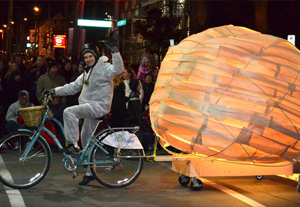As has become a yearly tradition, the School of Architecture’s entry in the Parade of Lights intrigued and enchanted more than 100,000-plus spectators this past Saturday night.
But the dazzling didn't stop there: equally as impressed were the parade's judges, awarding the School of Architecture first place for the float's creativity, use of lights and overall effect.
Earlier in the week, we met with architecture masters student Clayton Blackman and recent architecture graduate Mark Erickson to see the floats and discuss the creative process.
“We took it to another scale this year,” says Mr. Blackman as he stands beside an ensemble of giant hollow orbs of various designs.
Though the project had a central design team—which also included Matthew Kennedy and Adam Pelissero—everyone involved speaks about the project as a community effort; Mr. Blackman likens it to “raising a barn.”
The seven lanterns, each about the size of a car, spent more than two months in concept mode before proper construction on the frames began two weeks prior to the parade. It took a team of 30 to 40 people a few days to complete construction.
“It is a very collaborative, collective project,” explains Mr. Blackman, “but everyone also put their own individual creativity into it.”
Human power, human scale
The students experimented with new cladding ideas when creating the coverings for the lantern frames, using a lot of thin wooden veneer pieces instead of just cloth material. By using natural, reclaimed wood and other found materials, they hoped to offer a visual representation of sustainability.
The students took the sustainability theme a step further by opting out of the traditional truck and flatbed combo for mobilizing their entry. Instead, the lanterns were towed on small trailers by cyclists, in collaboration with I Heart Bikes, a local business started by recent Dal graduate Sarah Craig.
 This year’s entry is “about human power,” say Mr. Blackman and Mr. Erickson. The float organizers wanted to get the whole school involved, so they had engineering students do the lighting and had representatives from Dal’s ESS and business programs help pull the float by bike.
This year’s entry is “about human power,” say Mr. Blackman and Mr. Erickson. The float organizers wanted to get the whole school involved, so they had engineering students do the lighting and had representatives from Dal’s ESS and business programs help pull the float by bike.
The lanterns were designed to celebrate the atmosphere of festivals and architecture’s relation to the public. Lit from the inside, the thin pieces of veneer created transparency and a visual sense of lightness. Some of the lanterns even had shapes and patterns that created silhouettes.
“Each lantern has a theme that grew out of it naturally,” says Mr. Blackman.
The architecture students hope to create “a more human scale” for their work, and to encourage “interaction between spectators and paraders” by having multiple floats at eye level.
Dalhousie employee Maggie Snow has observed the construction and execution of the Dal architecture floats since they began in 2003. “I’m proud of the students,” she says, “They do this for the city and for the children.”
Urban fabric
This was Mr. Blackman’s fourth float and Mr. Erickson’s third. They hope that this year’s parade entry will set a bar for the future.
As many architecture students are working on their theses, the float offered a good hands-on opportunity to learn about different materials. It was also a creative collaboration that allowed everyone to contribute to the design throughout construction.
“What makes a good city is everyone approaching things from different angles, like pieces of an urban fabric,” says Mr. Blackman.”
Keeping with the sustainability theme, the giant lanterns will likely be reused as public art now that the parade is over.

